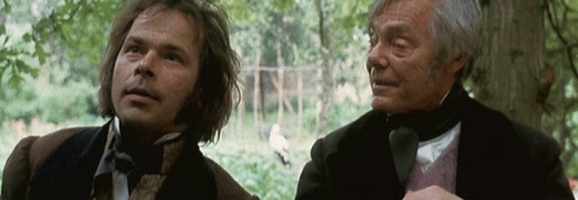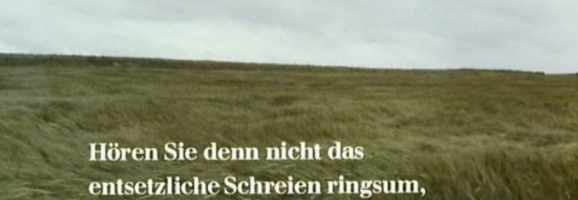The Enigma of Kaspar Hauser: Herzog’s Humanism

Werner Herzog, after finishing his landmark film, the exhausting Aguirre, the Wrath of God, which tells the historical tale of Spanish conquistador Lope de Aguirre, in 1972, sought to go after another mystifying piece of history, the story of the foundling Kasper Hauser. The film, The Enigma of Kaspar Hauser (or Jeder für sich und Gott gegen alle – Kaspar Hauser), was released two years later, in 1974, and seemed to bear a departure from the ecstatic, plodding bloodbath that was Aguirre.
Kasper Hauser, which is based on the true accounts of a boy found in Nuremberg, Germany in 1828, who claimed to have spent the first sixteen or so years in complete isolation, follows the historical account rather faithfully. Kaspar Hauser had to be taught how to speak, how to act, and how to think to be integrated into society. He was passed between homes as most families he stayed with grew aggravated with his behavior and he eventually died due to a mysterious stab wound. While historians claim that the stab wound was self-inflicted and that Kaspar’s story and behavior was an elaborate, almost sociopathic hoax, Herzog’s film leaves the story’s ambiguities intact. The titular protagonist of the film is portrayed as being truthful, and innocent.
Kaspar Hauser is much less brutal than Aguirre, though ironically, Kaspar is killed at the end of his film, whereas Aguirre survives. In this way the films are two heads of the same coin – the triumph of human conquest and greed and the tragedy against human weakness and innocence. And despite both films seeming to be concerned with human tragedy (man’s inhumanity to man, for our high school English lit friends) and an apparent nihilism against the meaning of man, both of Herzog’s films are incredibly humanistic in their secularism.

Aguirre, the Wrath of God is a title that indicative of a few things. For one, it seems to claim that Aguirre, who leads the Spanish conquistadors into the Amazonian oblivion, has the wrath of god, meaning he controls his comrades with little regard to reality and that this control is absolute. However, Aguirre’s confidence is at fault – he’s no match for the cold brutality of the jungle landscape. That is the true wrath of God, the harsh natural environment, that punishes Aguirre’s greed. And yet, this punishment is not a conscious decision by any intelligent being. There is no God in Aguirre’s world, only a cruel and indifferent jungle. In this way, Aguirre, the Wrath of God is a secular text, one that claims that humans are alone in the universe, that there are no absolute meanings nor any cosmic justice. Man is responsible for his own actions and his own meaning, however destructive or corrupt. It may seem strange, but Aguirre, the Wrath of God is entirely humanist.
The German title of Kasper Hauser translates into “Every man for himself and God against them all.” Like the aforementioned film, this title presents several different options to read into. But there are several instances in the film that guide the audience, or at least seem to.
The first and possibly most telling is in the very beginning of the film. While Pachelbel’s “Canon” plays over images of a barren field, the text: “Don’t you hear that horrible screaming all around you? The screaming men call silence.” Here, Herzog is directly speaking to the audience, telling them that they are alone and that this loneliness causes all men go mad. As in Aguirre, the audience knows this to be a godless world, with no universal truths or justice. In the context of this text, “God against them all” now can be read with some bitter irony, as God is against men because there is no God at all, leaving man to suffer without greater meaning.
Throughout the film, people weave in and out of Kaspar’s life, most giving up on him after seeing his erratic and illogical behavior. Most men in the film end up being depicted as foolish, such as the priests who pester Kaspar, asking him for visions, or the philosopher professor, who tests poor Kaspar’s logic with a logic puzzle that Kaspar answers unsatisfactorily. Kaspar is untainted by society’s institutions, educational, religious, or otherwise. It would not be out of line to consider him a “purer” human because of this.
One of the things that Kaspar struggles with is the notion of dreams, which Kaspar often confuses with real life. In a striking scene, though, Kaspar relates a dream he has to Professor Daumer, his caretaker. While “Canon” plays again, Kaspar tells the professor of a vision he had, a vision where an endless procession climbs a fog covered hill and at the top of the hill is Death. This vision is an allegory for a godless and meaningless existence, in which man climbs, blind, into Death’s arms and that is it. Kaspar understands this, probably better than the priests and the philosophers, because he is untainted by man’s persistent denial. Herzog emphasizes this by making them seem foolish and harsh.

And despite Kaspar’s revelation, he does not flirt with nihilism, the acceptance of no meaning. Instead, Kaspar continues to learn music and seems to hope to one day play beautifully. Pachelbel’s “Canon” fits in nicely with this, as the Baroque piece seems to represent a crystalline beauty for the sake of beauty, without attention to a higher meaning. Kaspar’s approach to meaning is highly humanistic, finding meaning in his own works. “Every man for himself,” while seemingly a dire situation, is merely a secular call for man to better himself. Man is not with or against “God,” but instead with himself.
Without historical accuracy taken into account, the film tells its audience that Kaspar is murdered by a mysterious man. On his death bed, Kaspar relates one more vision he had. A blind man leads a caravan through the desert (here represented by striking, grainy footage of the Sahara Desert), but the caravan is lost and wants to move toward the mountains. The blind man tells them the mountains are an illusion and then leads them to the city. This vision parallels the other vision, the one with Death on the hill, quite impressively, as the caravan is visually and thematically similar to the procession on the hill. Both are lost, but it is the blind man who explains to them that the mountains (or the hill) is merely an illusion, and to move on. Here, death (or Death) is the illusion, and should not be the focus of life. Kaspar sees this, but does not know how to convey it well. Life is important, not death. This is the humanist thesis of the film.
After Kaspar is dead, his body undergoes an autopsy. The doctors remove his brain, which they claim suffers from a “remarkable abnormality,” and that is that. This scene, which shows the brain being dissected up close, is remarkable in its stark up-frontness of the treatment of the human body by science. Here we have the brain of the protagonist, who the audience has spent much time with and practically befriended, being cut open on a table. Kaspar has been reduced to a gray blob for science to study and is no longer human. The scribe, who appears throughout the film, taking notes on the events surrounding Kaspar, interviews the doctors, who tell him of Kaspar’s brain, and the film ends as the scribe skips down the street, excited that he will write a “wonderful, precise” report. He also mentions, before walking off into the essentially sunset, with glee, “Finally we have got an explanation for this strange man.”
For all of man’s persistence in finding meaning in God and logic in the film, man is also incredibly materialistic, reducing the human body to a specimen that must be explained away. This materialism wins in the end of the film, thus the tragedy of Kaspar Hauser is the death of humanism. The film seeks to arouse a secular humanism in its audience by exaggerated just how cold the world is to Kaspar. It was man who killed Kaspar, not any god, as God is absent or at least indifferent, as he is in Aguirre. Kaspar’s life, times, and death are all human affairs and should be understood as thus.
What do you think? Leave a comment.











Obviously this is not an out and out comedy, but I’m sure Herzog knew what that was making something that was hysterically funny. I’d love to see a remake with Jack Black in the titles role.
You know, there’s something about Bruno Schleinstein that almost recalls Jack Black (except you know, that Bruno Schleinstein’s performance is truly great, whereas Jack Black’s performances are only above average) ; )
Maybe they should make a sequel…?
I think it had a good portion of intentional comedy, due to the editing and the good, honest, intelligent writing. It’s a rare type of comedy, seldom seen in the quicker paced movies of today, but only available through the medium of film. It’s difficult to find, but Mike Leigh’s movies have this type of intelligent, visually expressed humor.
It was undoubtedly meant to be partially comedic but beyond a few touches this is largely an atrocious piece of work by Herzog. It is probably the worst piece of work I have seen by him other than Nosferatu which is memorably bad.
Oh, wow…why don’t you like it? I think it’s one of his best.
Something that really bothered me was the opening sequence. As the film opens we see the oar of a rowboat. Eventually the boat come up a river to a woman washing her laundry in the river. Then the music abruptly stops, seemingly by mistake, and we abruptly cut to story cards of Kaspar Hauser. Again, after the story-cards the music abruptly stops again.
Herzog mentions in the commentary that he wanted to show some shots in the beginning that were about how the world might look like to an adult man who has never experienced it before. The windy field of grain was a beautiful shot and then also some of the subsequent shots (and dream sequence shots) through two stacked lenses (I didn’t find that effect to be interesting personally but I got the idea).
The thing I don’t get is why would you abruptly cut off of the music? What is the purpose and what is the meaning of the opening scene which seemingly has no relationship to anything else in the movie. He does not address these in the commentary.
I think Kubrick (or some directing icon) once said that the opening scene will normally be a representation of the mood or concept of the film. It is perhaps the most important scene. Kaspar Hauser’s opening scene was confusing and questionable at best.
It’s interesting that you brought up Kubrick at the end of your post because while reading the comment, I was already thinking of bringing him up myself. Kubrick is a master of opening his films (the first images in 2001 are completely operatic (even the MGM lion fits in)). My take on the opening of Kaspar Hauser sets the dreaminess of the film, but also the stark feeling of waking up from a long sleep. You ask why the music cuts off; because it signals waking from that dream. Waking up is something very difficult to pull off in art, but I think Herzog really captures both slumber and being awoken well here.
What the hell are you on about? That was the best shot of the film.
I’d seriously re-consider delving further into Herzog’s work if you didn’t like it, as, in a way, it’s what he searches for in all his films.
Near the beginning, with the beautiful shot of the cornfields, and then Pachelbel’s Canon in D kicks in…
Damn. My dad made me watch this when I was 8 and I hated it. Out of interest I watched it again when I was 16 and…..dear God…..must have opened a gate or something because when that music kicked in…..I was reduced to tears. And I’m proud I could have a moment like that.
Thanks for the essay.
Pure operatic ecstasy–
This was a very good movie but quite dark, I nearly started looking for a rope and a bar of soap after my first viewing…
Great essay. You find some very striking intersections between the two films. One question: you mention that the “cold brutality of the jungle landscape” punishes Aguirre’s greed. I agree with your overall analysis of this film, but I do not feel that Aguirre is punished. Based on his final monologue, he still believes that he is the wrath of god. (“The earth I pass will see me and tremble.”) Instead of seeing the ending as the jungle punishing Aguirre, can we perhaps read it as Aguirre becoming a part of the jungle?
Yes! Your perception of the film is apt. When I said that the jungle was punishing Aguirre, I meant more that the jungle was punishing to the human forces in general. From the first shot, the beautiful landscape is pitted against the conquistador explorer party and from then on, pulls and tears at every ounce of humanity they hold on to. To be human in the film is to have inherent weakness.
Aguirre is a strange case because he is both incredibly human and deeply inhuman and this is one of the ambiguities of the film. I do believe he is not punished at the end of the film, and I agree that he becomes a “part” of the jungle or even transcends it.
Great comment, great dialogue.
It’s a movie and Herzog does not care for cinema verite – he isn’t after realism and facts but a (in parts authentic and in parts stilized) “ectatic truth”.